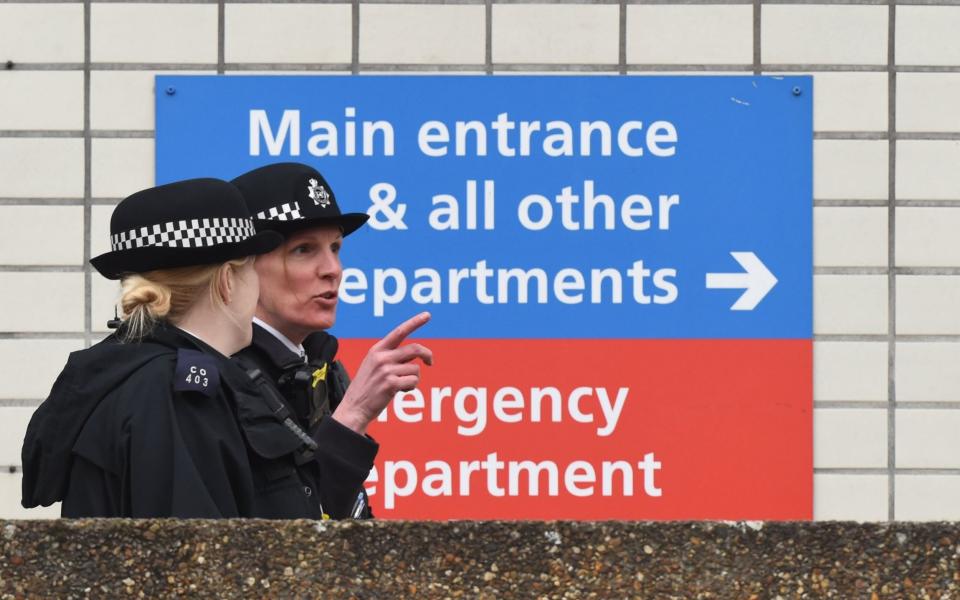A attendances at lowest point since records began amid coronavirus outbreak


Gravely ill people are staying away from hospital due to coronavirus, with a lower number of A&E visits last month than at any time since current records began.
Medical leaders are appealing for patients with serious conditions to continue using the NHS after the first official data since the lockdown began revealed a 29 per cent year-on-year drop in A&E use, including a 50 per cent drop in heart attack attendances.
A total of 1.53 million people went to an A&E department in March compared to 2.17 million the year before, while emergency admissions also showed a sharp fall, down 23 per cent to 427,921.
NHS England said the fall was "likely to be as a result of the Covid-19 response".
It follows the publication of figures in Scotland this week which suggests patients are dying because they are avoiding going to hospital during the coronavirus outbreak.
Hospital services across the UK have been dramatically altered to prepare for the expected peak of Covid-19 patients, forecast to be at least seven days away.
This includes the cancellation of the majority of out-patient appointments and the discharge of as many in-patients as possible.
Despite the reconfigurations, services for non-Covid-19 patients with urgent and acute needs remains open. But medical leaders fear many are staying away because they do not want to burden the NHS or are afraid of contracting the virus in hospital.
On Wednesday, the medical director for NHS England, Professor Stephen Powis, implored people to go to A&E "just as you always have done" if they have symptoms of a stroke or heart attack.
Meanwhile, the British Heart Foundation (BHF) said on Thursday that as many as 5,000 people a month who would normally have gone to hospital with symptoms of a possible heart attack are putting their lives at risk by staying at home.

Public Health England figures show the number of people attending emergency departments with symptoms of a possible heart attack dropped from an average of around 300 per day at the beginning of March to around 150 per day by the end of that month.
Dr Sonya Babu-Narayan, a consultant cardiologist and associate medical director at the BHF, said: "These are uncertain times, and it's understandable that people might feel apprehensive about having to go to hospital or putting unnecessary strain on the NHS, but heart attacks don't stop for a global pandemic.
"Don't delay because you think hospitals are too busy – the NHS still has systems in place to treat people for heart attacks, and they are still a top priority."
The picture in hospitals across the UK varied dramatically this week. Some trusts in London – where the coronavirus outbreak is most widespread – are reportedly struggling to cope with the influx of Covid-19 patients, although NHS bosses insisted there was enough critical care capacity even before the NHS Nightingale temporary hospital opened in the capital's docklands.
By contrast, many provincial hospitals have cleared out all but the most ill non-coronavirus patients but are still waiting for the surge of those with Covid-19. A source in Cambridge said the city's Addenbrooke's Hospital had more than 400 empty beds earlier this week – roughly a third of the total.
Dr Gregor Smith, the Scottish interim chief medical officer, said this week that doctors across Scotland had told him the NHS was "eerily quiet" for illnesses apart from coronavirus.
On Thursday, leading figures in the UK Government gave the strongest indication yet that they may take into account the collateral damage to health from the outbreak when deciding how to lift the lockdown.
Professor Chris Whitty, the chief medical officer for England, said: "There are indirect effects which have to be taken into account when we're thinking about the health effects over the long term.
"There is still room in intensive care, there's still room in emergency services and across the country in terms of other health issues. But we also have to remember the effects on things that have to be delayed to free up NHS space, and we have to think about the effects of the long term health effects of some of the economic measures."
Nigel Edwards, the chief executive of the Nuffield Trust thinktank, said the drop of a fifth in A&E attendances in March compared to February could be down to "responsible decisions" by many patients.
He added: "However, we know that senior clinicians are seriously worried that some patients who really need urgent treatment may also have been deterred from attending, which could result in delayed diagnoses and poorer outcomes over time.
"Ambulance response times also worsened in March, which may be a Covid-related pressure that has so far received less attention than intensive treatment unit capacity."
Dr Katherine Henderson, the president of the Royal College of Emergency Medicine, said that although the number attending A&E in March was the lowest since records in began in their current form in 2010, there were more admissions as a proportion of attendances.
"We are concerned that this drop in attendance may mean that people with serious health problems are avoiding going to their emergency department for fear of getting coronavirus,” she said.
While the number of people visiting A&E has dropped, the volume of calls to NHS 111 has surged.
"This suggests that many of those who might have attended A&E previously could be seeking clinical advice elsewhere, and that 111 is playing a critical role in advising people on how to access care,” said Tim Gardiner, of the Health Foundation.
"On the face of it, this may indicate that people are following the official advice to try to avoid going straight to A&E."

